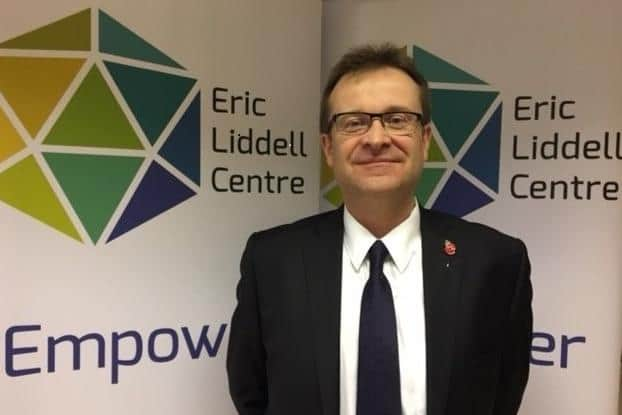How Edinburgh's Eric Liddell Centre is fusing the third and private sectors - John MacMillan comment
and live on Freeview channel 276
I want to use that time to be the best husband, dad, friend, chief executive, colleague, work partner and service provider I can be and leave a positive impact on the people I know, love and work with and for. To help me with this, I’m working on two lists – the "to do” list and the “to be” list.
I started my career as a professional musician, becoming a manager in the public sector. Five years ago, I became chief executive of the Eric Liddell Centre in Edinburgh.
Advertisement
Hide AdAdvertisement
Hide AdThe Centre is 40 or so years old and is one of the capital’s few specialist dementia charities. It also runs a host of other activities in its building in a converted church at Edinburgh’s Holy Corner – so named as at one stage there was a church on every corner of the intersection.


I have introduced a number of business activities at the Centre, the most recent being a networking event for business people to meet, talk, exchange views and broaden the circle of who they know.
People ask me why as a CEO of a charity I want to reach out to the business community and I say that so much can be achieved when the third sector and business come together.
A perfect example of this was at the height of the pandemic last year – we had just closed our building following guidance from the Scottish Government and all of our care support had to quickly adapt to this unique situation.


Advertisement
Hide AdAdvertisement
Hide AdAs part of our response to the needs of vulnerable people and families throughout the city, we quickly launched our Lunch Delivery Programme, in partnership with McLaren’s on the Corner (which is part of the Signature Group) – a great restaurant/bar across the road from us.
They immediately responded to help and provided a team of their chefs to make as many lunches (at no cost!) as they could each day, to match what the Eric Liddell Centre could do.
Once the project was agreed and ready to go, we put out an emergency call to arms, seeking volunteers to then deliver this much-needed food to families throughout Edinburgh – 12 hours later, we had almost 70 volunteers who delivered food on foot, and by bike and cars, with important funding support from Celtic FC Foundation and the City of Edinburgh Council.
Our wonderful volunteers included business folk who might be able to do an hour or two, through to workers who were on furlough, along with stay-at-home parents, students, retirees, and doctors and nurses who would help us in between long and challenging shifts in our hospitals.
Outcome
Advertisement
Hide AdAdvertisement
Hide AdThe outcome of this was 7,567 lunches delivered to people and families who needed the provision of food support, bearing in mind that a proportion of this group were in the sheltered category and as such, couldn’t leave their home, so the delivery of food was a lifeline for many.
I believe that business experience provides an additional skillset that sometimes the third sector does not have. If charities can tap into this skill base, at the very least they will be able to improve their practise and develop a more entrepreneurial approach that will enhance what they do.
Since becoming CEO of the Centre, I have implemented a more business-like approach to everything the charity does, in particular developing networks and partnerships that ultimately improve the range and level of services that we can provide directly or via a joined-up approach.
The closure of the Centre due to Covid-19 meant a loss of of £225,000, or £15,000 a month, a huge financial loss for any charity.
Advertisement
Hide AdAdvertisement
Hide AdOur recovery plan has included the employment of a business specialist who is developing a more robust approach to maximising our existing and potential resources, income-generation potential, while also removing any inefficiencies.
My priority is to ensure the future sustainability of the Eric Liddell Centre care charity and to safeguard the ongoing support we provide to some of Edinburgh’s most vulnerable people via our existing services – specialist Dementia Day Care Service, Carers Programme, Befriending Service, Counselling Support, Dementia Support Programme and our community hub operations.
A prime example of how the Eric Liddell Centre engages with business is its ongoing work with Scottish Widows.
The firm and other corporate bodies have for a number of years approached the Eric Liddell Centre to offer it and other charities a Day to Make a Difference which involves their employees volunteering for a day to help in any way they can. This has involved painting, decorating, cleaning, helping in the Centre’s Café and many other helpful activities.
Advertisement
Hide AdAdvertisement
Hide AdHowever, when we had a group of senior executives, I felt that it would be a waste of their skills and knowledge if we asked them to work in this way.
Rewrite the rules
I therefore delivered a presentation on who we are and what we do as a charity, shared our Business Plan and challenged them to supportively rip it to shreds and show us how they would tell our story. I also asked them to develop a pitch for funders/philanthropists who might consider investing and/or donating to our charity.
This approach has proven to be successful and productive, while maximising the skills and experience from business in a charity context – this skills swap has added value to what we do.
I also want to raise the profile of one of Scotland’s most iconic individuals – Eric Liddell, “The Flying Scotsman”, to bring his story to society’s younger generation and be the catalyst to sharing his legacy on an international stage, in the lead-up to the centenary of his success at the Paris Olympics when it takes place in 2024. Part of Eric Liddell’s remarkable life is featured in Oscar-winning film Chariots of Fire, which was directed by one of our patrons, Lord Puttnam.
Advertisement
Hide AdAdvertisement
Hide AdAt the Eric Liddell Centre, we all want to follow the example of some of the best charities out there via values – to be inclusive, to be compassionate and striving for excellence.
It’s not rocket science, but it’s not easy either – we are committed, resilient, hardworking and ultimately, effective – this helps us to make a difference.
John MacMillan, CEO, Eric Liddell Centre
A message from the Editor:
Thank you for reading this article. We're more reliant on your support than ever as the shift in consumer habits brought about by coronavirus impacts our advertisers.
If you haven't already, please consider supporting our trusted, fact-checked journalism by taking out a digital subscription.
Comment Guidelines
National World encourages reader discussion on our stories. User feedback, insights and back-and-forth exchanges add a rich layer of context to reporting. Please review our Community Guidelines before commenting.
